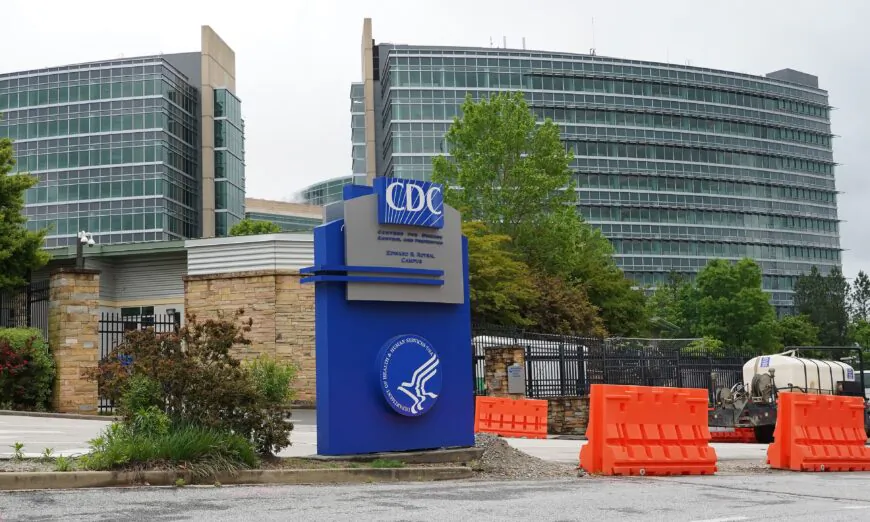
The Centers for Disease Control and Prevention (CDC) headquarters in
Atlanta on April 23, 2020. (Tami Chappell/AFP via Getty Images)
The U.S. Centers for Disease Control and Prevention (CDC) is still planning on recommending people receive a COVID-19 shot on an annual basis, the agency’s director says.
“We are likely to see this as a recommendation for an annual COVID shot, just like we have an annual flu shot,” Dr. Mandy Cohen, the director, said in a podcast episode released on Aug. 9. “And I think that will give more folks clarity about should they get one or not, because the answer is like, ‘Well, did you get one this year? If not, go get the new COVID shot.'”
She said that the CDC will likely make the recommendation in the coming weeks.
“This will be an annual vaccine … to make sure that you stay protected,” Dr. Cohen said.
Dr. Cohen was commenting after Rep. Brad Wenstrup (R-Ohio), chairman of the U.S. House of Representatives Select Subcommittee on the Coronavirus Pandemic, questioned her over what data would support annual shots and asked for a briefing on the matter.
Dr. Wenstrup gave the CDC until Aug. 16 to provide answers. The agency has not done so yet, a spokesperson for the panel said.
Dr. Cohen had said in July, in one of her first interviews after becoming the CDC’s director, that the agency was poised to recommend annual shots.
Waning Immunity
U.S. officials initially said people would only need a primary series to protect themselves against COVID-19 but in 2021, less than a year after recommending vaccination for virtually everyone, they authorized and advised boosters to try to stem waning immunity.
As newer variants have emerged, the vaccines have performed even worse, leading to recommendations for additional boosters and, in the fall of 2022, the clearance of updated bivalent shots from Pfizer and Moderna. Those shots later replaced the companies’ old vaccines.
The U.S. Food and Drug Administration (FDA), which decides whether to clear vaccines, said in June that it was directing Pfizer and other manufacturers to update the shots again to target the XBB.1.5 strain because the vaccines “appear less effective against currently circulating variants (e.g., XBB-lineage viruses) than against previous strains of virus.”
But XBB.1.5 has already been largely displaced by other variants, including EG.5. That undercuts the new strategy, Dr. Harvey Risch told The Epoch Times in an email.
“The boosters will be out-of-date before they are even released,” Dr. Risch, professor emeritus of epidemiology at the Yale School of Public Health, said. “As well, CDC has already said that efficacy of new boosters in preventing spread is transient and wanes, thus there is little reason to see the boosters as beneficial.”
A CDC spokesperson told The Epoch Times via email: “Dr. Cohen’s expert opinion is based on the science, which indicates that vaccine-induced immunity wanes and the COVID-19 virus is likely to continue to evolve. As she has said before, if the science changes, the agency will adapt its recommendations.”
The COVID-19 vaccines have never been 100 percent effective. No trial efficacy data exists for the currently available vaccines, but observational data indicate they provide transient protection against infection and severe illness, even turning negative after several months.
There is no evidence supporting the idea that the shots provide protection for one year.
“Federal mandates did not stop the spread or transmission of the COVID-19 virus. Should the CDC issue a recommendation for an annual COVID-19 vaccine, it will mark a significant change in federal policy and guidance regarding the COVID-19 vaccines and how they are utilized,” a spokesperson for the House panel told The Epoch Times via email. “Serious questions remain as to whether the science would support such a recommendation.”
In support of the planned recommendation, the CDC pointed to a modeling study and a series of other studies highlighting waning immunity from the original shots, all of which were based on data from 2022 and earlier. The agency also cited a study that found the currently available boosters did not produce “robust neutralization” against newer variants.
Some of the papers concluded that people with so-called hybrid immunity, or vaccination on top of natural immunity, have the best protection. Other research has found that the latter protection, derived from recovering from COVID-19, is as good as or better than that from vaccines, though little data is available from recent months.
Timeline
Executives with Pfizer and Novavax have said they expect the FDA to authorize the new shots by the end of August. Moderna also makes a COVID-19 vaccine. Johnson & Johnson’s shot is no longer authorized.
After the FDA authorizes the latest formulations, the U.S. government plans to phase out the older shots. according to a planning document from the U.S. Department of Health and Human Services, the parent agency of both the FDA and the CDC.
The FDA has indicated it will not require trial efficacy data before authorizing the new shots but will monitor observational data, similar to its stance on the influenza vaccines.
After the authorizations, the Advisory Committee on Immunization Practices (ACIP), the CDC’s vaccine advisers, plans to meet to discuss for whom they will advise the CDC to recommend the shots. The CDC does not have to accept the advice, but often does.
“The FDA anticipates taking timely action to authorize or approve updated COVID-19 vaccines in order to make vaccines available this fall. After their authorization or approval, ACIP will meet to make a recommendation outlining use of these updated vaccines this fall,” the CDC spokesperson said.
The CDC has recommended, including in its latest slate of recommendations, that virtually every person receive a primary series. The CDC did ease up on booster recommendations in the most recent recommendations, saying some people did not need additional shots, in the first formal recognition of the high levels of natural immunity in the population.
No comments:
Post a Comment